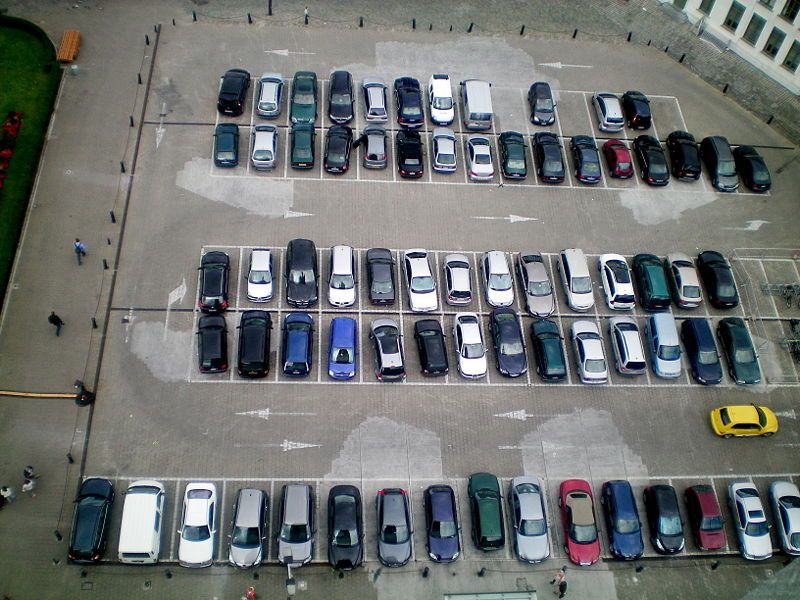Americans are driving less. Young people are choosing not to drive at all. Yet most cites continue to impose high minimum parking requirements on housing developers.
These policies conflict with the character and amenities of today’s transit-oriented developments, which can support a relaxing of minimum parking requirements. I recently offered testimony to the planning commission in Evanston, Ill. on why cities need to reform outdated parking regulations. But my recommendations for the inner Chicago suburbs are applicable to cities across the country.
Creating excessive parking artificially increases the cost of housing. In fact, generous parking allowances inflate the cost of new properties by 10-20 percent. Surface parking can cost $4,200 per space, while underground parking in a high-rise development can cost between $20,000 and $60,000 per space or more. That parking is not free. Developers typically pass parking costs directly on to the price (or rent) of a unit, which artificially inflates the asking price and puts pressure on housing prices in the surrounding neighborhood.
Developments with lowered parking requirements can succeed. Many municipalities have added flexibility to their requirements when the transportation options exist and the market warrants it. Portland, Ore., for example, reduced minimum parking requirements by 50 percent within 500 feet of its transit system. Two Portland developments, Buckman Heights and Buckman Terrace, used this change to directly pass on savings to consumers in the form of more affordable rents.
San Diego and Santa Monica, Calif. have relaxed requirements for affordable units near transit. After San Francisco eliminated parking minimums for the Mission Bay redevelopment, developers unbundled parking entirely and now allow residents to rent spaces separately. The university town of Fayetteville, Ark. allows developers to swap bicycle and car parking. In Evanston, downtown requirements have been relaxed for apartment buildings.
Creative solutions can help manage parking demand. Car sharing offers options to residents who need a car for an occasional trip, but take transit, walk or bike most of the time. A transit-oriented housing development in Chicago, near the Blue Line at the Ashland, Division and Milwaukee intersection, recently opted to forgo private spaces in favor of car share vehicles. Not only did all 99 units find tenants, but 40 of them joined Enterprise CarShare. Enterprise reports that tenants in 32 of the units — one-third of the building’s households — actually sold their vehicles to move to the area. Shared parking can also manage demand for spaces, as ones intended for office traffic during the day will be free for visitor traffic at night.
Tools exist to manage parking demand. Smartphone apps like SpotHero and Park Circa enable owners of parking spaces to rent them out for $2 to $4 a day. Just like travel site Airbnb, these tools help regular people get more value out of their real estate by linking consumers to one another. Moreover, an adequate supply of parking might already exist in proximity to development if pricing were adjusted to fit demand — all it takes to find out is a survey and a dynamic pricing scheme. In April 2012 the Chicago Metropolitan Agency for Planning published a report called “Parking Strategies to Support Livable Communities” to help municipalities understand how to do this, and has started dynamic parking pricing plans in the Wicker Park/Bucktown neighborhood as well as the Village of Hinsdale.
The Center for Neighborhood Technology recently completed the Right Size Parking Calculator for Seattle’s home of King County Wash., led by King County Metro Transit, funded by the Federal Highway Administration, with input from the Urban Land Institute and advised by a national team that included leading parking researcher Donald Shoup. The intensive, three-year project measured parking utilization by time of day at a representative sample of residential parking facilities in the county.
The relationship found between parking demand and location efficiency, meaning convenience and regional connectivity, was clear and unequivocal. On average, parking in multifamily dwellings is oversupplied in King County by 0.4 stalls per dwelling unit. The results convinced the county and several municipalities to use the calculator to support demonstration projects, including policy-based work to align parking regulations with regional goals.
Reducing minimum parking requirements can work in Evanston, King County, cities and regions across the country. By promoting car sharing and more efficient use of existing parking spaces, cities will prioritize people over parking.
The Center for Neighborhood Technology, a grantee of the Surdna Foundation, is a Chicago-based non-profit focused on sustainable cities. CNT promotes the better and more efficient use of the undervalued resources and inherent advantages of the built and natural systems that comprise the urban environment.















